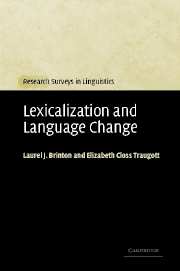Book contents
- Frontmatter
- Contents
- List of figures
- List of tables
- Preface
- List of abbreviations
- 1 Theoretical contexts for the study of lexicalization and grammaticalization
- 2 Lexicalization: definitions and viewpoints
- 3 Views on the relation of lexicalization to grammaticalization
- 4 Toward an integrated approach to lexicalization and grammaticalization
- 5 Case studies
- 6 Conclusion and research questions
- References
- Index of names
- Index of subjects
- Index of words and forms
2 - Lexicalization: definitions and viewpoints
Published online by Cambridge University Press: 03 February 2010
- Frontmatter
- Contents
- List of figures
- List of tables
- Preface
- List of abbreviations
- 1 Theoretical contexts for the study of lexicalization and grammaticalization
- 2 Lexicalization: definitions and viewpoints
- 3 Views on the relation of lexicalization to grammaticalization
- 4 Toward an integrated approach to lexicalization and grammaticalization
- 5 Case studies
- 6 Conclusion and research questions
- References
- Index of names
- Index of subjects
- Index of words and forms
Summary
Introduction
Lexicalization is the process by which new items that are considered “lexical” (in terms of the theory in question) come into being. Several broad definitions can be found in the literature (Brinton 2002):
(a) ordinary processes of word formation (see 2.1),
(b) processes of fusion resulting in a decrease in compositionality (see 2.3),
(c) processes of separation resulting in an increase in autonomy (see 2.4)
Definition (a) occurs primarily in discussion of dynamic processes available to speakers synchronically that give rise to nonce forms, which may or may not come to be conventionalized and accepted later by other speakers (a process called “institutionalization,” see 2.2). Definitions (b)–(c) occur primarily in discussion of change. In almost all the work considered in this chapter, a conceptual opposition is assumed between relatively free forms organized by rules and principles (the grammar) and fixed forms occurring in inventories (the lexicon). In particular, there is recognition of some version of a continuum or scale from relatively free, syntactic types of expression to highly compressed types of expression. This is a matter of compositionality, or the extent to which “the meaning of … expressions (in particular sentences) can be reconstructed from the meanings of their individual elements and their syntactic relationship to one another” (Bussmann 1996:s.v. “principle of compositionality”).
- Type
- Chapter
- Information
- Lexicalization and Language Change , pp. 32 - 61Publisher: Cambridge University PressPrint publication year: 2005

